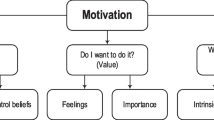Abstract
Mentoring tenure-track faculty is effective and increasingly utilized but there is demand for concrete mentoring strategies for navigating the ambiguities of the tenure track. The key driver of ambiguity—and therefore of candidate angst—is that some important aspects of the tenure decision cannot be determined until quite late in the tenure track. Two such aspects are the strength and number of external reviews the tenure committee may receive as evaluations of research effectiveness and the determination of teaching effectiveness. This paper proposes some ambiguity management strategies for implementation by candidates and their mentors as soon as the first year.
Similar content being viewed by others
Notes
See Conley and Önder (2014) for an insightful and sobering review of this topic.
Faculty mentors are also a key resource for developing strategies for shepherding papers from complete first drafts to submissions; through the revise-and-resubmit process; and to publication. Mentors might share referee reports received for their own manuscripts and describe (1) how they successfully revise manuscripts but particularly (2) how they process rejections and keep moving forward relatively undaunted.
See Sarsons et al. (2020).
I appreciate—and concur with—a referee’s suggestion that homework and exams can also vary in degree of difficulty, such that it may be optimal to have relatively more difficult homework that leads to the exam. Certainly a range of difficulty can also be built into one’s use of old exam questions as homework.
References
Blau, Francine D., Janet M. Currie, Rachel T.A.. Croson, and Donna A. Ginther. 2010. Can Mentoring Help Female Assistant Professors? Interim Results from a Randomized Trial. American Economic Review (Papers & Proceedings) 100(2): 348–352
Boring, Anne. 2017. Gender Biases in Student Evaluations of Teaching. Journal of Public Economics 145: 27–41
Braga, Michela, Marco Paccagnella, and Michele Pellizzari. 2014. Evaluating Students’ Evaluations of Professors. Economics of Education Review 41: 71–88
Conley, John P., and Ali S. Önder. 2014. The Research Productivity of New PhDs in Economics: The Surprisingly High Non-Success of the Successful. Journal of Economic Perspectives 28(3): 205–215
Conrad, Cecilia. 2013. The Tenure Process at Liberal Arts Colleges. Newsletter of the American Economic Association’s Committee on the Status of Women in the Economics Profession, Winter: 7–8, 13, at https://www.aeaweb.org/content/file?id=587.
Croson, Rachel. 2013. Tenure Letters. Newsletter of the American Economic Association’s Committee on the Status of Women in the Economics Profession, Winter: 9, 14, at https://www.aeaweb.org/content/file?id=587.
Fenn, Aju J., Daniel K.N.. Johnson, Mark Griffin Smith, and J.L. Stimpert. 2010. Doing Publishable Research with Undergraduate Students. Journal of Economic Education 41: 259–274
Fountain, Joselynn, and Kathryn E. Newcomer. 2016. Developing and Sustaining Effective Faculty Mentoring Programs. Journal of Public Affairs Education 22(4): 483–506
Hamermesh, Daniel S. 1992. A Young Economist’s Guide to Professional Etiquette. Journal of Economic Perspectives 6(1): 169–179
Kuld, Lukas, and John O’Hagan. 2017. The Trend of Increasing Co-Authorship in Economics: New Evidence. VoxEU, at https://voxeu.org/article/growth-multi-authored-journal-articles-economics.
Melicher, Ronald W. 2000. The Perceived Value of Research and Teaching Mentoring by Finance Academicians. Financial Practice and Education, Spring/Summer: 166–174.
Muschallik, Julia, and Kerstin Pull. 2013. Mentoring in Higher Education: Does It Enhance Mentees’ Research Productivity? Journal of Education Economics 24(2): 210–223
Rath, Katharina, and Klaus Wohlrabe. 2016. Recent Trends in Co-Authorship in Economics: Evidence from RePEc. Applied Economics Letters 23(12): 897–902
Sarsons, Heather, Klarita Gërxhani, Ernesto Reuben, and Arthur Schram. 2020. Gender Differences in Recognition for Group Work. Journal of Political Economy 129(1): 101–147
Savage, Shari L. 2015. Mapping Tenureland: A Researcher Stalled. Studies in Art Education 57(1): 76–87
Sheridan, Brandon J., Gail Hoyt, and Jennifer Imazeki. 2014. A Primer for New Teachers of Economics. Southern Economic Journal 80(3): 839–854
Tollefson-Hall, Karin, Amy Pfeiler-Wunder, Kevin Hsieh, and Carole Henry. 2013. Speaking from Experience: Advice to Junior Faculty for Navigating the Tenure-Track. Journal of Faculty Development 27(3): 44–48
Wagner, Jeffrey. 2015. A Framework for Undergraduate Research in Economics. Southern Economic Journal 82(2): 668–672
Wagner, Jeffrey. 2017. Humanities as Technology in Teaching Economics. International Review of Economics Education 25: 35–40
Walia, Bhavneet, and Shane Sanders. 2016. Teaching Preparation and Placement in ‘Non-Top-Tier’ PhD Programs. Southern Economic Journal 83(1): 332–336
Wild, Lynn, Anne Marie Canale, and Cheryl Herdklotz. 2017. The Power of Many: Mentoring Networks for Growth and Development. College and University 92(2): 37–41
Acknowledgements
I am grateful to Co-Editor Julie Smith; two anonymous reviewers; and my colleagues Cynthia Bansak, Andrew Herbert, Jonathan Wight, and Anne Winkler for several helpful and encouraging comments that greatly improved the first version of this paper.
Author information
Authors and Affiliations
Corresponding author
Additional information
Publisher's Note
Springer Nature remains neutral with regard to jurisdictional claims in published maps and institutional affiliations.
Rights and permissions
About this article
Cite this article
Wagner, J. Concrete Strategies for Economics Tenure-Track Faculty and Their Mentors. Eastern Econ J 47, 449–459 (2021). https://doi.org/10.1057/s41302-021-00189-5
Published:
Issue Date:
DOI: https://doi.org/10.1057/s41302-021-00189-5



